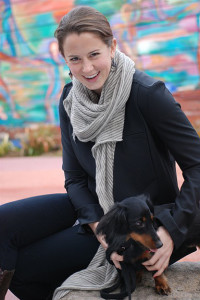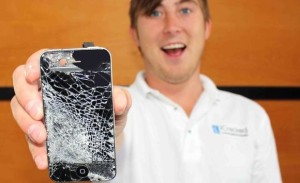 Elizabeth Schmidt graduated from Middlebury College in Vermont and ambitiously entered the Teach for America program in a world quite different than the one she grew up in – South Central, Los Angeles. One of the first assignments she gave her tenth graders was a research paper, but when the due date rolled around only %5 of the students turned it in. Instead of becoming upset, Schmidt changed her approach. She reassigned the paper, but with a topic that was relevant to her students. The students were asked to to research any after-school or summer program within the greater Los Angeles community, and to write a compelling argument as to why they should attend. And this time the reward was much greater than a grade: the top seven essays would win attendance to the program. The idea worked and 75% of the students turned in their paper on time. Schmidt ran a marathon to raise money for tuition, and Wishbone was born.
Elizabeth Schmidt graduated from Middlebury College in Vermont and ambitiously entered the Teach for America program in a world quite different than the one she grew up in – South Central, Los Angeles. One of the first assignments she gave her tenth graders was a research paper, but when the due date rolled around only %5 of the students turned it in. Instead of becoming upset, Schmidt changed her approach. She reassigned the paper, but with a topic that was relevant to her students. The students were asked to to research any after-school or summer program within the greater Los Angeles community, and to write a compelling argument as to why they should attend. And this time the reward was much greater than a grade: the top seven essays would win attendance to the program. The idea worked and 75% of the students turned in their paper on time. Schmidt ran a marathon to raise money for tuition, and Wishbone was born.
According to the founder herself, “The main principle behind Wishbone is in teaching students to help themselves, empowering them through the discovery of authentic and independent passions.” The goal is twofold: 1. to expose the student to new and diverse communities, and to help him or her think about their future and how to pursue it, and 2. give students a drive to graduate high school and move on to college or a professional field. Because students find their program and apply for the Wishbone grant themselves, they are able to take pride in their work and start the process of working towards Wishbones goals, as well as ensure that the program they choose matches their passions and talents.
Schmidt is unable to run the amount of marathons it would take to raise money for all of the students Wishbone supports today. Instead, donations work similar to crowdfunding. Donor’s are able to watch a one minute pitch from students and learn their story. They can then either grant a wish fully or make a partial donation – a minimum of $25. Donors are then able to track their students story. This accountability can add new motivation for students.
There are several aspects of this organization I find admirable. First, Schmidt did not become frustrated or passive about the problems she and these children faced. Instead, she chose to make schoolwork relevant to students’ experiences and give them hope for something more than they saw. Second, Wishbone is not just a handout. The students that receive scholarships do so because they put in the work to find and apply for the programs. Not only this, they encourage all students to constantly set goals for the future. Lastly, creating the sort of quality media to crowdfund Wishbone’s products is essential. Their website, videos, and blog are beautiful and functional. Donor’s ability to follow the story after they have contributed creates a relationship with the organization that keeps them coming back.
The first seven students to win Schmidt’s contest all graduated from high school and continued on to college, and in its first year of existence Wishbone sent 150 students to programs in Los Angeles, New York City, and San Francisco. Schmidt still runs Wishbone and works with students, and her team has expanded to several advisers and partners. I would encourage you to check out their website and watch some of their incredible videos.

 We all have that pothole on the way to work, unattractive vacant lot across the street, or overgrown playground that we wish would magically be taken care of upon waking up the next day. However, most things in life are not magically taken care of, and most of us don’t make the effort to take care of them ourselves. In the aforementioned cases the policy is usually to report hazards or unsightliness to the correct local government department and hope that it is taken care of within the next year. Unfortunately, the steps for civic responsibility are often difficult or unclear and weeds end up remaining for much longer than necessary.
We all have that pothole on the way to work, unattractive vacant lot across the street, or overgrown playground that we wish would magically be taken care of upon waking up the next day. However, most things in life are not magically taken care of, and most of us don’t make the effort to take care of them ourselves. In the aforementioned cases the policy is usually to report hazards or unsightliness to the correct local government department and hope that it is taken care of within the next year. Unfortunately, the steps for civic responsibility are often difficult or unclear and weeds end up remaining for much longer than necessary. Have you ever thought about what happens to that bar of soap you open at a hotel for your night’s stay? Shorter visits may only require you using less than a quarter of the bar, and before David Bishop thought about this conundrum the soap would be tossed out with the trash when housekeeping came around. The estimated one million bars of soap from hotels thrown away each day in the United States then become chemical waste in landfills. Bishop recognized this problem and connected it with another – child mortality rates.
Have you ever thought about what happens to that bar of soap you open at a hotel for your night’s stay? Shorter visits may only require you using less than a quarter of the bar, and before David Bishop thought about this conundrum the soap would be tossed out with the trash when housekeeping came around. The estimated one million bars of soap from hotels thrown away each day in the United States then become chemical waste in landfills. Bishop recognized this problem and connected it with another – child mortality rates.
 It’s a problem nearly all of us will face at some point in our lives – a shattered cell phone. With or without a phone case, we are bound to have our screens scratched, broken, or falling off. AJ Forsythe experienced this several times firsthand, and rather than taking it to the store where it was purchased, he decided to fix it himself. Buying parts from the Internet and with some help from his friends, Forsythe fixed his iPhone in his college dorm room, a service that would have cost hundreds of dollars or required replacing his phone entirely had he gone to a retailer.
It’s a problem nearly all of us will face at some point in our lives – a shattered cell phone. With or without a phone case, we are bound to have our screens scratched, broken, or falling off. AJ Forsythe experienced this several times firsthand, and rather than taking it to the store where it was purchased, he decided to fix it himself. Buying parts from the Internet and with some help from his friends, Forsythe fixed his iPhone in his college dorm room, a service that would have cost hundreds of dollars or required replacing his phone entirely had he gone to a retailer. Julia Hu is doing something dozens of others are doing. But she is doing it right and she is doing it better. Hu created a wristband called LarkLife that tracks sleep patterns, diet, and exercise. Millions of people attempt to log their food intake and fitness for the day through phone apps and website, but have trouble keeping up. This is not the only issue – Hu and her 21 employees at Lark Technology believe that people are not challenged to change their life simply with raw data. “When you look at everyone in the world, about 3 to 4 percent are motivated by data. These are Olympic athletes, highly goal-oriented people, and tinkerers,” Hu explains. “The rest of the population is not at all motivated by numbers–or is actually negatively motivated by seeing numbers.”
Julia Hu is doing something dozens of others are doing. But she is doing it right and she is doing it better. Hu created a wristband called LarkLife that tracks sleep patterns, diet, and exercise. Millions of people attempt to log their food intake and fitness for the day through phone apps and website, but have trouble keeping up. This is not the only issue – Hu and her 21 employees at Lark Technology believe that people are not challenged to change their life simply with raw data. “When you look at everyone in the world, about 3 to 4 percent are motivated by data. These are Olympic athletes, highly goal-oriented people, and tinkerers,” Hu explains. “The rest of the population is not at all motivated by numbers–or is actually negatively motivated by seeing numbers.”